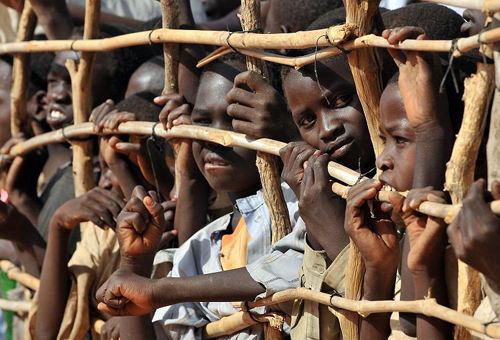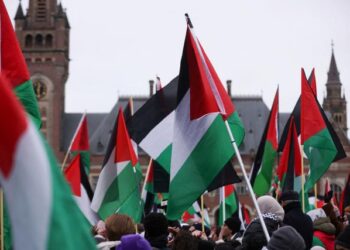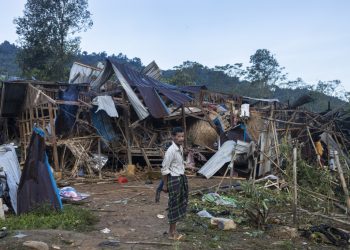Human Lives Human Rights: Conflict in the Darfur region of Sudan between Arabic- and non-Arabic-speaking tribes over the past decade has resulted in a severe humanitarian crisis.
According to the United Nations, more than 2.7 million people have fled from their homes to camps for internally displaced persons (IDPs) or to refugee camps in neighboring Chad, and up to 300,000 people have died from war, hunger, and disease since the conflict started.
The origins of this conflict go back many years, but in 2003, organized rebel forces began attacking government targets, accusing the Government of Sudan (GoS) of oppressing black Africans in favor of Arabs. In response, the GoS attacked the rebel forces, but some observers allege it also targeted non-Arabic-speaking civilians, in contravention of international laws of war.
Observers have also accused the GoS of having links with the Janjaweed militias, nomadic Arabs who attack settled black farmers, although the GoS denies any such links. Indeed, reports of systematic, targeted assaults on non-Arabic-speaking civilians, of large-scale disruption of rural livelihoods, and of deliberate consignment to living conditions likely to cause death have prompted some observers to accuse the GoS of genocide (violent crimes committed against a national, ethnical, racial, or religious group with the intention of destroying that group) and the International Criminal Court to issue arrest warrants for the allegedly responsible authorities.
Medical Evidence of the Humanitarian Crisis in Darfur
Between September 28, 2004, and December 31, 2006, 325 patients were seen at the Amel Centre. According to their medical records, 292 patients from 12 different non-Arabic-speaking tribes alleged that they had been attacked by GoS or Janjaweed forces in rural areas across Darfur.
Nearly all the patients reported that they had been attacked in the absence of active armed conflict between GoS/Janjaweed forces and rebel groups. Half of them claimed that they had been beaten, two-fifths reported gunshot wounds, a third reported destruction or theft of property, and nearly a third reported involuntary detainment.
Half of the 73 women seen at the center disclosed that they had been sexually assaulted, often near IDP camps. Only 198 medical records contained sufficient detail to enable the researchers to determine whether the documented medical evidence was consistent with the alleged abuses.
However, in all these cases, the researchers judged that the medical evidence was consistent with, highly consistent with, or virtually diagnostic of the alleged abuses.
These findings provide credible medical evidence that is consistent with torture and other human rights violations being inflicted on non-Arabic-speaking civilians in Darfur from 2004 to 2006. These findings cannot be used to estimate the population incidence of attacks on civilians or to corroborate claims of assailants’ identities or of genocidal intent.
Moreover, their accuracy may be affected by several limitations of this study. For example, during the study period, only patients who obtained a medical evidence form from the police were permitted to receive treatment from an authorized medical officer; obtaining such a form likely represented a considerable hurdle to accessing health care services.
Nevertheless, the widespread, organized, and sustained pattern of attacks documented in this study is consistent with the possibility that the actions of Janjaweed and GoS forces during the conflict in Darfur may constitute war crimes, crimes against humanity, and/or acts of genocide. Importantly, these findings also highlight the need to provide adequate protection for health professionals working in countries affected by internal conflicts.
In the Darfur region of western Sudan, ongoing conflict between Arabic-speaking and non-Arabic-speaking tribes has reached crisis proportions since the Government of Sudan (GoS) first initiated its military response to organized armed groups opposing the GoS.
In addition to targeting armed rebel forces in its response, however, the GoS has also been accused of targeting non-Arabic-speaking civilians, namely members of the Fur, Masalit, and Zaghawa tribes. By the end of 2007, more than 2.4 million refugees from the violence, or nearly one-third of the population, had fled to camps for internally displaced persons (IDPs) within Darfur or to similar refugee camps in neighboring Chad, thus creating a severe humanitarian disaster.
Previous research has focused on generating accurate mortality estimates to inform policy and programming, with recent studies estimating 200,000–300,000 deaths directly and indirectly attributable to the conflict in 2003–2005 alone.
The reported systematic, repeated, targeted assaults on non-Arabic-speaking civilians, large-scale disruption of rural livelihoods, and deliberate consignment to conditions conducive to death have prompted observations that these could constitute acts of genocide.
Following a United Nations–appointed Commission of Inquiry and an International Criminal Court (ICC) investigation, the Pre-Trial Chamber I of the ICC issued arrest warrants for allegedly responsible authorities, including two arrest warrants for Sudanese President Omar Hassan Ahmad Al Bashir (“Al Bashir”) on the grounds of crimes against humanity (March 4, 2009) and genocide (July 12, 2010).
Despite investigations into the violence in Darfur, little research to date has been able to make use of Sudanese documents to substantiate victims’ or observers’ claims of violence amounting to war crimes, crimes against humanity, or genocide.
GoS forces were implicated in the Atrocities Documentation Survey. Arab Janjaweed (“men with guns on horses or camels”) militias, which originated as Libyan proxy militias in the Chadian civil war and have been suspected of collaborating with GoS forces, have been implicated in reports of sexual violence described by Darfuri women now living in IDP camps.
The systematic destruction of livelihoods, which under certain circumstances can be considered an act of genocide has also been described. However, a critical limitation of prior studies is their reliance on self-report data gathered from victims living in refugee camps outside of Sudan.
The team of investigators attempted to conduct interviews at IDP camps within Darfur but was refused access by the GoS. With unique access to medical records of clinical encounters in Darfur, they undertook this study to characterize the nature and geographic scope of alleged abuses against civilians in Darfur and to substantiate the allegations with forensic review and analysis of the medical evidence.


















